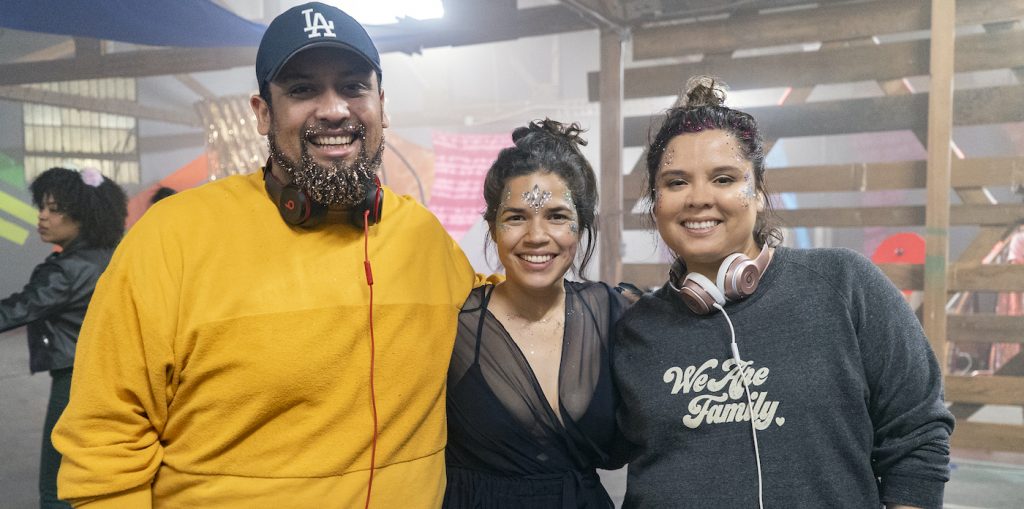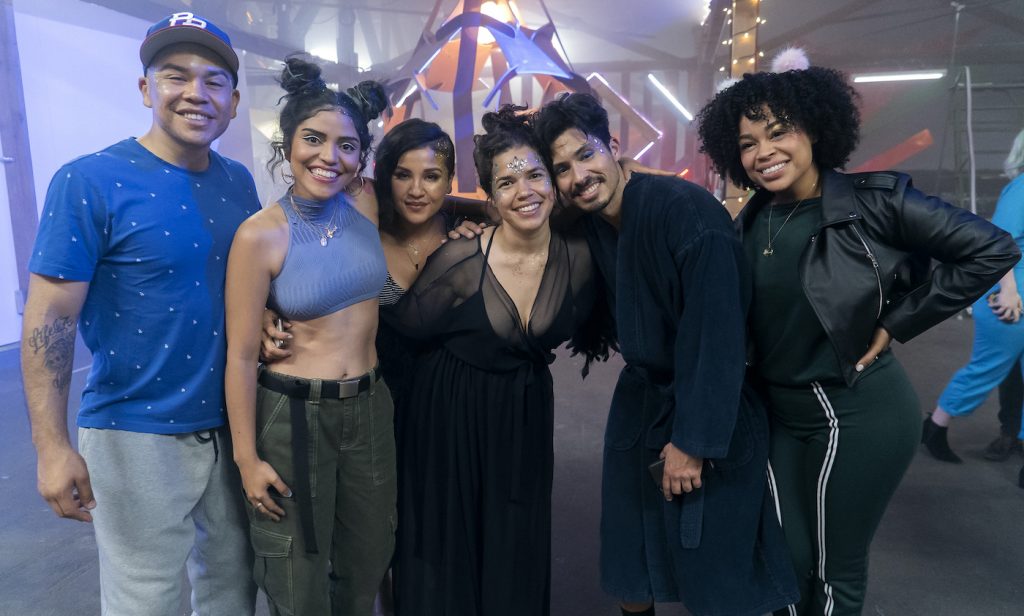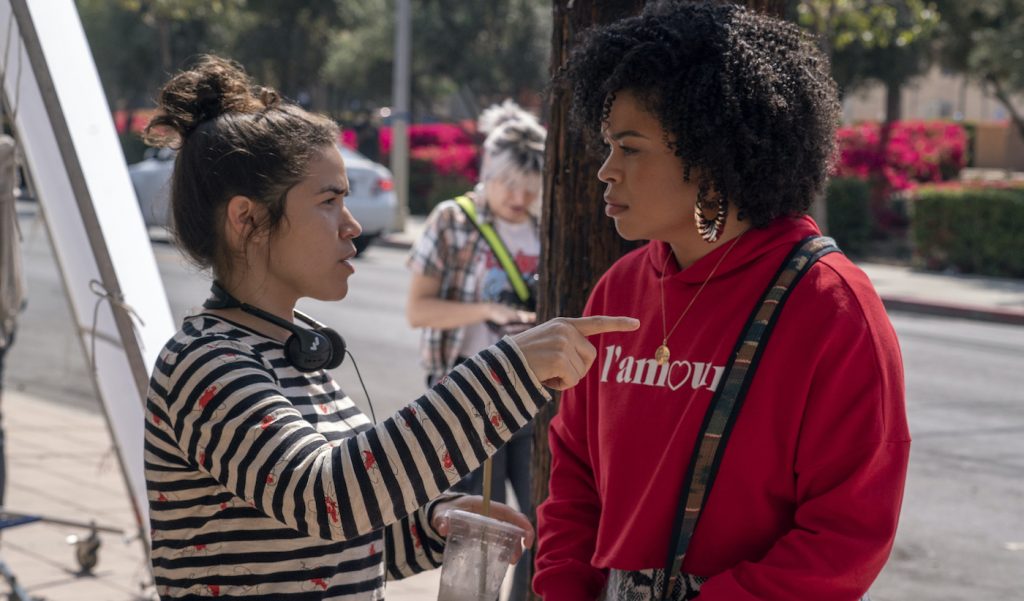The Cast of Gentefied on Netflix’s Glorious New Series
Season 1 of Gentefied is now streaming on Netflix, which is cause for all fans of great content to celebrate. The show, which has been in the new “top ten in the US today” category on the site since its launch date on February 21st, focuses on an extended Latinx family in LA’s Boyle Heights. It follows them as they confront the gentrification of their neighborhood, and what it means to them as individuals, as a family, and as a community.

A bilingual half-hour dramedy, Gentefied was created by first-generation Chicano writers Marvin Lemus and Linda Yvette Chávez and is produced by America Ferrera. It centers on a beloved but struggling taco shop named Mama Fina’s, named after the matriarch of the family, but run by her widower husband Casimiro “Pop” Morales. His grandsons, the well-read high-school dropout Erik (J.J. Soria) and chef-in-training Chris (Carlos Santos) have differing ideas of how to make the family business successful enough to keep the greedy landlord at bay. Frequent visitors to Mama Fina’s include Pop’s artist granddaughter Ana (Karrie Martin) and her activist girlfriend Yessika Castillo (Julissa Calderon), and Lidia (Annie Gonzalez), a Stanford grad, educator, and mother-to-be, who might be Erik’s girlfriend but will do whatever is best for her baby. These characters are straddling two worlds, hoping they don’t have to abandon one for the other. Can they both keep their native culture and embrace the promise of the American dream?
What makes Gentefied so engrossing is the arcs of the non-stereotypical, multi-faceted characters. Too little content offers more than portrayals of drug lords, domestic workers, and gang members. Lemus and Chávez wanted to represent the many colors and nuances of the Latinx experience that they have been surrounded by their whole lives. In an interview for The Credits, cast members J.J. Soria, Carlos Santos, Karrie Martin, Julissa Calderon, and Annie Gonzalez shared how they felt a kinship to their characters, and why they believe this is such a groundbreaking show.

For her portrayal of Lidia, Annie Gonzalez mined her experience growing up with a hardworking single parent, and believes Lidia and Erik’s story arc reveals a lot about expectation and judgment. “I wasn’t raised with my father growing up, and I found some healing through this role because I feel like it gave my parents the ending they themselves were not able to have. It helped me understand that, before my mom was my mom, she was a whole woman, in love, and working as a woman of color in the education system. She was being systematically oppressed, forced to code-switch, constantly renouncing a part of herself. She was just trying to navigate her life. After playing this role, I could tell her ‘I see you, and I’m so sorry.’” She continued, “I saw my dad, too, who was dealing with a whole other set of expectations and judgments. That’s why the relationship between Erik and Lidia is so important for the overall compassing of the message. It is saying that our community is worth pouring into, our men are worth pouring into. Their anger, frustration, and aggression is just passion they don’t know how to actualize in a healthy way, for themselves, their community, and humanity.”
J.J Soria, who plays Erik, said he relates to both his own character and Chris, who is judged as being a ‘coconut’ and not being Latinx enough. “I’m what people call a ‘bocho’, someone who doesn’t speak Spanish. I was raised in a town right next to Boyle Heights called El Sereno, and the kids would shame me for speaking Spanish, so I stopped speaking it. My grandparents used Spanish as their secret language, so they didn’t teach it to their kids. Still, I look very Latino. To look one way, and not speak Spanish, and to get shamed by the Latinx community for not being Mexican enough, I had no idea where I belonged.”
Carlos Santos spoke about relating to Chris’s feeling of ‘otherness’, which he believes is relatable to a lot of people. “The thing about Chris is, it’s a daily struggle for him. He has three things he’s fighting for: His dream, his community, and his family. He comes back from Idaho with all this information and experience that’s different from what people in Boyle Heights are going through. I can relate to that. I was born and raised in Puerto Rico and left after my first year of college. I came to California, and have been on my own, without my family. We all strive to find a kind of acceptance wherever we are. For every good friend I’ve made here, I have a hundred terrible stories. I feel like I understand Chris very well. I understand not feeling Latinx enough, or not feeling worthy enough to be considered part of the community. I’ve heard that a lot since the show came out, that it’s a feeling I share with a lot of people out there.”
When asked what aspects of the show they are most proud of, Karrie Martin and Julissa Calderon had some thoughts. Martin loved the authenticity of how it expresses bilingualism. “It’s so special that it shows, and I’d say normalizes, how our parents speak to us in Spanish, and we respond in English. This is our life. It’s not just Mexicans, it’s all Latinx people. For that to be represented, it’s such a minuscule part of what the show is, but it makes the representation so magnetic to those of us who have never seen ourselves onscreen before. We’re shown the way we really are as families.”
Calderon appreciates that the show concretely reflects and supports LA Latinx culture. She offered an example. “Yessica wears a lot of Latinx brands on the show. You don’t see artists from Boyle Heights or Washington Heights who are showcased on this kind of huge platform. In the beginning, knowing the character is Dominican and an activist, I knew I wanted to represent, so I wear work by a Dominican from Washington Heights, Tony Peralta of Peralta Project. I wear some of his pieces on the show. Our community loves him.”

Calderon also spoke about working with so many women. In bringing these stories to life, the creators of Gentefied made sure that the voices in front of and behind the camera are representative and diverse. Six of the episodes are directed by women of color. Enthused Calderon, “Most of this production is centered around women and women of color. I’ve never seen a set like this. The best part about it was that they owned the space. They didn’t declare themselves separately, they just stood in their power. They were in all of their glory on the sets, and seeing that allowed me to know I could do whatever they needed. I felt safe to explore and go farther.”
Everyone in the cast mentioned specific, positive exchanges they’ve had with fans since Gentefied has aired. Annie Gonzalez believes those reactions are the result of people finding themselves reflected onscreen. She explained, “The complexity and the realism of the way the show is written, and how it makes even us, as actors, feel seen, is something that I have found really moving. Now that the show is out, I’m hearing it from so many people, that they are feeling seen for the very first time, and in so many small ways, that would only exist through writers that have experienced it themselves.”



